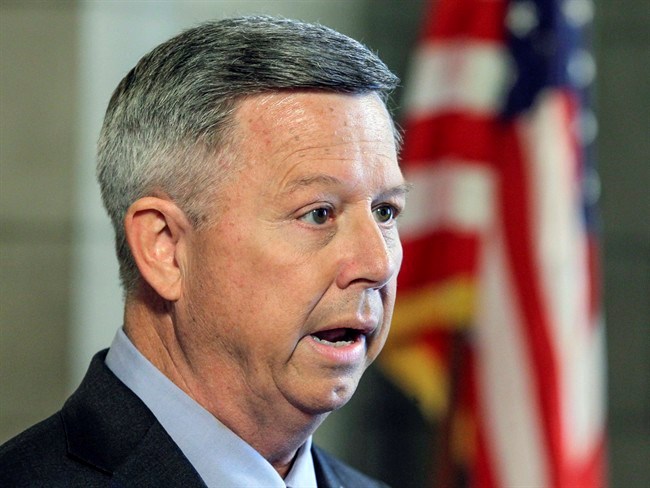The fate of TransCanada's controversial Keystone XL pipeline now rests with the U.S. State Department after Nebraska's governor gave his blessing to a new, less environmentally damaging route through his state.
Dave Heineman sent a letter to President Barack Obama on Tuesday confirming he would allow the oil pipeline to go through Nebraska along a revised path that skirts ecologically sensitive areas.
Because Keystone XL would cross an international border, it requires approval from the U.S. State Department and Obama.
"We did receive a letter from the governor of Nebraska approving the route through the state of Nebraska. We will obviously take that letter and the Nebraska environmental report into consideration as we continue our federal review process," said State Department spokeswoman Victoria Nuland.
It was previously expected that a decision would be announced in the first quarter of 2013, but Nuland said it's looking like it will take longer than that.
Calgary-based TransCanada is seeking approval for a $5.3-billion pipeline that would carry crude from Alberta's oilsands and U.S. shale formations to Steele City, Neb.
That pipeline would link up with another $2.3-billion conduit line to Texas refineries, which is 40 per cent complete. That segment does not require a federal permit.
The two projects were originally part of one big pipeline proposal that the Obama administration rejected last year. TransCanada opted to cut it up into two projects while the Nebraska issues were sorted out.
The southern leg should be in service later this year, while TransCanada expects the northern portion to start up in late 2014 or early 2015, despite the State Department delay.
"I'm still optimistic that this thing can be done in a relatively short period of time. All of the work's been done," TransCanada CEO Russ Girling told reporters in his downtown Calgary office.
With the Nebraska issues resolved, Girling said "I think we can expeditiously move our way through the rest of the process."
Construction can begin within weeks of a State Department approval, he said.
About 9,000 people are eager to start working on the pipeline, he added.
"These people want these jobs and our job is to try to get this done as quickly as we can."
Some critics of Keystone see it as an environmental threat and symbolic of a wrong-headed energy policy, both because of potential oil spills and because of the amount of carbon released by the oilsands extraction process.
The project has faced some of its strongest resistance in Nebraska from a coalition of landowners and environmental groups who say it would contaminate the Ogallala aquifer, a massive groundwater supply.
The revised route still crosses part of the aquifer, though Nebraska's environmental watchdog says any spills would be localized and TransCanada would be responsible for any cleanup.
The Nebraska Department of Environmental Quality says the new route avoids an area of fragile grass-covered sand dunes known as the Sand Hills and a shallow groundwater area.
Jane Kleeb, executive director of the group Bold Nebraska, says Heineman's decision is "one of the biggest flip-flops in Nebraska history."
"He approved the pipeline route that crosses the aquifer after he asked President Obama to deny the route that crossed the aquifer," she said.
"Heineman turned his back on landowners and citizens who asked for an unbiased review of the risks of this pipeline. It is a shame when a politician these days can't cross party lines even to stand up for our water and family farmers and ranchers."
Anthony Swift of the Natural Resources Defense Council said while Heineman's decision was "disappointing," there was still hope the State Department will reject it.
"The president signalled that his administration would refocus on climate during his inaugural speech" on Monday, said Swift.
"He can do that by saying no to this ill-advised tarsands pipeline."
Alberta Premier Alison Redford, a staunch supporter of Keystone XL, said she was pleased with Heineman's decision, while acknowledging it's not Alberta's place to decide U.S. domestic matters.
"Continued and new market access for Alberta's globally important crude resources is the single-most critical issue facing our province," said Redford, whose government has seen resource revenues dramatically fall as a result of discounted Alberta crude.
Federal Natural Resources Minister Joe Oliver also welcomed the decision.
"Our desire is to work with the Obama administration in achieving final approval," he said.
"We believe Keystone XL will enhance the future economic prosperity and security of both Canada and the United States."
Since being tapped by the Obama administration as Hillary Clinton's replacement as secretary of state, Senator John Kerry has provided no clues about Keystone XL's prospects.



